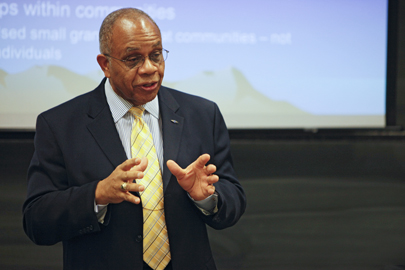World Health Day: Serving up food safety
Food safety expert was a mediator for the World Health Organization
 Photo/Mike Lovett
Photo/Mike LovettTheodore Johnson
With the goal to reduce the global burden of foodborne disease, the World Health Organization is launching an international food safety awareness campaign on World Health Day, Tuesday, April 7.
WHO estimates that food contaminated with harmful bacteria, viruses, parasites or chemical substances caused more than a half billion illnesses and 351,000 human deaths worldwide in 2010.
Theodore Johnson, an assistant professor in the Coexistence and Conflict program at Brandeis’ Heller School for Social Policy and Management, takes this issue to heart. From 2006 to 2010, he worked with the secretariat of Codex Alimentarius, an international intergovernmental food safety organization and advocacy agency created by the WHO and the Food and Agriculture Organization. Johnson worked as a negotiation and mediation trainer and consensus building coach at meetings that discussed food safety concerns and policies for the world.
BrandeisNOW caught up with Johnson to learn more about his work and for some domestic and international perspective on food safety.
How does Codex Alimentarius promote world health?
Codex Alimentarius is a 185-member country organization that looks largely at how to regulate, study and promulgate rules and recommendations for the global community around issues of food. Its main goals are to protect the health of consumers and ensure fair practices in the international food trade. Its primary process for decision-making is through building consensus among its members while also considering inputs from numerous non-governmental, industrial, consumer protection and other agency groups.
In what ways is the struggle for safe food different around the world than it is here in the U.S.?
One of the big factors is severe poverty. The level of extreme poverty we see in other parts of the globe is just not at the level we see here in the U.S. One of the biggest challenges for many poor people in the world is cooking meals outside or in homes that have only dirt floors. Many cooking stoves burn wood, various oils and other fuels that are environmentally harmful in the confines of small spaces. Indoor cooking in these environments creates carbons in the air that harm the quality of life in the home. Another aspect of poverty is the lack of a balanced diet. Often, available foods may be high in protean, such as rice or beans, however there is often a lack of fresh fruits and vegetables. Water is also frequently contaminated and carries various harmful pathogens.
What has Codex and the international community done to address these issues?
The international community should do more, but there are some political and economic challenges that are difficult to overcome. Regarding the specific problem of a healthful cooking environment, Codex, WHO and various non-governmental organizations, such as Teri Institute in India, have helped by distributing millions of solar ovens and lamps. This helps eliminate harmful carbons from burning coal, oil, or wood that harm health. As a result of this and many other strategies, overall health quality rates are going up, food safety and education levels are going up, and infant mortality is going down. With these types of programs and interventions, we see a measurable increase in the overall quality of life in many poor countries.
So what’s the biggest food safety issue here in the U.S.?
Product labeling, specifically regarding genetically modified organisms, tends to be a rather large issue, and there is huge political pushback. Many U.S. food manufacturers and distributors feel the current law is adequate to protect consumers. The food industry believes that the public will equate labeling with warnings – like the warnings on cigarette packaging – rather than providing useful product information. As a result, there is a huge fear over loss of profitability, which drives their opposition. Many consumers and food safety advocates see this as an excuse to protect profit over the value of education and health.
As an academic and coexistence practitioner, I firmly believe that information is power. When those with valuable information suppress it, they are manipulating aspects of truth. When information is withheld from people where it could contribute to the ability to make clear choices — that is socially and morally wrong. People should have access to as much information as possible to make personal choices for their own well-being.
Categories: General, International Affairs, Research





